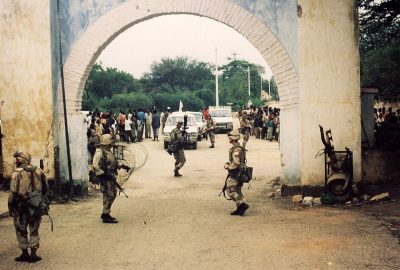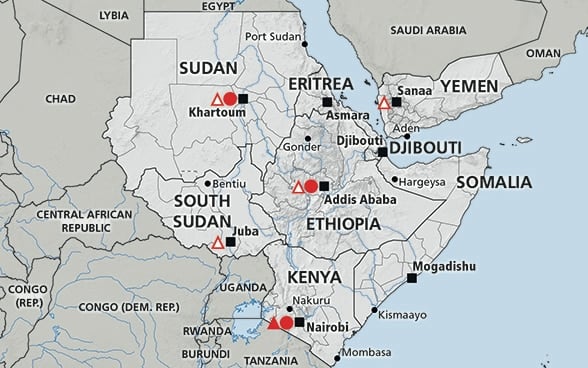Instability in Somalia Endangers the Entire Horn of Africa
Divisions with breakaway areas further hampers the resolution of broader issues

Somalia has warned governments in the Horn of Africa and corporations seeking to conduct business in the region that Mogadishu will not tolerate any contracts which do not recognize it as a unified state.
Although for decades two breakaway areas within Somalia–Somaliland and Puntland–have operated as independent states while largely ignoring the authority of the successive central administrations since 1991, every attempt at forming a unified government in the capital has excluded the recognition of these two enclaves as sovereign entities.
In recent months there has been a diplomatic row between Ethiopia and Somalia over the signing of a Memorandum of Understanding (MOU) between President Muse Bihi Abdi of Somaliland and the government of Prime Minister Abiy Ahmed in Addis Ababa. Ethiopia being a landlocked country has historically since the 19th century sought to have access to the Red Sea.
Somalian President Hassan Sheikh Mohamud signed a new bill into law in January nullifying the MOU between Somaliland and Ethiopia which would provide access to Addis Ababa of a section of the port of Berbera on the Red Sea. This MOU, which the Somalian government has strongly objected to, was signed in exchange for Ethiopian recognition of Somaliland as an independent state.
This is the first time that another state has accepted Somaliland as a separate government and territory not under the rule of Mogadishu. These developments between Ethiopia and Somalia have created an increasingly tense atmosphere in the larger Horn of Africa region.
These two states have a history of conflicts over territorial boundaries which were set during the onset of colonial rule in Somalia and the efforts to marginalize Ethiopia as an independent state. However, the breakaway of Somaliland and Puntland from Somalia proper further complicated any attempts aimed at the normalization of relations.
In late 2006 and early 2007, Ethiopia under the previous government led by the Tigray People’s Liberation Front (TPLF) and the Ethiopian People’s Revolutionary Democratic Front (EPRDF), sent troops into Somalia at the aegis of the United States to prevent the consolidation of the political bases of the then Union of Islamic Courts. Soon the Kenyan Defense Forces (KDF) and the Ugandan People’s Defense Forces (UPDF) intervened in Somalia. Eventually these East African military forces were joined together as the African Union Mission in Somalia (AMISOM).
Funding and training for this multinational mission in Somalia was adopted as a United Nations project with the stated aim of defeating the Islamist rebels who remained in opposition against the transitional federal government backed by Washington and the UN. Since 2007, the AU-UN presence in Somalia has not resulted in the establishment of a unified and secure state.
Since 2007, the mission has gone from peacekeeping to transitional and now stabilization. However, as the titles of the AU-UN presence has shifted, new difficulties are arising which frustrate the objectives of peace and unity in Somalia. The divisions and ongoing clashes with al-Shabaab cannot be fully addressed as long as the internal fragmentation inside the country provides opportunities for imperialism to exploit the lack of a cohesive political framework within the administrative state.
Economic Implications of Divisions Within Somalia
What is Somalia willing and capable of doing in response to these initiatives involving Somaliland? With the government still being dependent on the AU and UN which are relying on material and monetary assistance from Washington and the European Union (EU), in practical terms the options of the government in Mogadishu will remain limited.
Ethiopia has played an integral role in the various AU-UN missions in Somalia making it extremely difficult for Mogadishu to lose this military support. Even with the recent pledge from the Egyptian government of President Abdel Fattah el-Sisi to Somalia to provide military assistance, the enactment of such policies would necessitate the recruitment and deployment of additional Somalian forces on the ground.
Addis Ababa views this offer by Egypt as a security threat due to the continuing dispute over the full implementation of the Grand Ethiopian Renaissance Dam project (GERD). The Egyptian government has said that the redirecting of the Blue Nile as envisioned through GERD would endanger its water supply.
Repeated attempts to negotiate an amicable solution to the disagreements over GERD have failed. The inability to achieve a diplomatic solution to the usage of water resources for hydro-electric power in the Horn of Africa region will undoubtedly impede development which could benefit all states involved. Somalia in its threats to corporate interests has raised the stakes in the overall efforts to foster unity and cooperation in the Horn of Africa.
In a report published by Business Insider Africa it notes that:
“Somalia had issued that by the 1st of September, all companies with operations in Somalia, should have revised any information they have on their platform which recognizes Somaliland as an independent territory. They warned that this would be taken seriously. The country advised that information put out by said organizations should permeate that Somaliland still remains a territory of Somalia, otherwise, punishments would follow. As seen in the East African, the Ministry of Commerce and Industry (MoCI) in Somalia used the country’s provisional constitution to compel corporations into removing the name of Somaliland off their network information sites.”
Such restrictions being placed by the central government in Somalia on corporations could very easily force these business interests to formally take sides in the dispute. If they continue to sign separate agreements with Somaliland, these firms could be prohibited from carrying out operations with the Somalian administration which is recognized by the AU and the UN.
The origins of the Somaliland and Puntland crisis are to be found in the colonial partitioning of Africa between Italy and Britain. Another colonial power, France, had maintained control of the area now known as Djibouti and called it French Somaliland.
There are additional Somali populations in Kenya as well as Ethiopia. In 1960 at the time of independence, the areas of Somalia formerly controlled by Italy and Britain merged creating a united republic with Puntland, whose name is taken from the ancient kingdom which can be dated backed thousands of years and noted for its trade with Egypt, Sudan and other territories in the Horn of Africa, North Africa and West Asia.
However, the civil war in Somalia during the 1990s further aggravated already existing tensions among these regions of the country. Somaliland declared itself independent from the central government in 1991. Later in 1998, Puntland asserted its separateness while initially saying it would not seek recognition as an independent state. Nonetheless, in 2024, Puntland authorities said that it would be independent due to disagreements with the central administration in Mogadishu over constitutional issues.
As acknowledged in the above-mentioned article from Inside Business Africa, the current situation has implications for various corporations and governmental institutions seeking to conduct business with Somaliland. Various aspects of these disagreements include:
.
“Paysii, Dahabshil Jubba Express and Ethiopian Airlines, are some of the companies that were called out, and asked to cease using the name Somaliland and instead go with Somalia. In the case of Ethiopian Airlines which flies from the capital city of Somalia; Mogadishu to the capital city of Somaliland; Hargeisa, Somalia asked that it should stop listing the Somaliland destination as a separate country.”
Unity Remains a Necessity in the Struggle Against Imperialism in Africa and West Asia
Even though these states of Somalia, Egypt and Ethiopia exist within close geographical proximity from one another, the absence of a guiding Pan-African foreign policy inevitably threatens the peace and security of the entire region. Considering the resources which exist in the Horn and North African regions, the people of these three states could make a historic contribution to the development of the continent along with ending the crisis in West Asia involving the struggle for the liberation of Palestine.
At present the genocidal onslaught by the State of Israel in Gaza, the West Bank and other neighboring states such as Lebanon, Iraq, Syria and Yemen cannot be ignored by the AU member-states in North and East Africa. Egypt has been essentially neutralized from resuming its rightful role as a leading force against settler-colonialism and Zionist occupation.
Since the late 1970s with the signing of the Camp David Accords, Egypt has become the second largest recipient of direct assistance from Washington trailing only the State of Israel. These arrangements have been placed under tremendous strain since the beginning of the Al-Aqsa Flood on October 7, 2023.
Mass sentiment within the AU member-states is overwhelmingly in solidarity with the Palestinians and other oppressed people in the West Asia region. Unity within Somalia and between Mogadishu and other contiguous states in the Horn of Africa could make a tremendous contribution in the broader objectives of eliminating neo-colonialism and imperialist domination.
The divisions and conflicts in the Horn of Africa can only serve to benefit imperialism. The AU and other international bodies must consider the importance of resolving these contradictions as a precursor for the sustainable development of Africa and other neighboring regions.
*
Click the share button below to email/forward this article to your friends and colleagues. Follow us on Instagram and Twitter and subscribe to our Telegram Channel. Feel free to repost and share widely Global Research articles.
Get Your Free Copy of “Towards a World War III Scenario: The Dangers of Nuclear War”!
Abayomi Azikiwe is the editor of the Pan-African News Wire. He is a regular contributor to Global Research.
Featured image is from Internationalist 360


